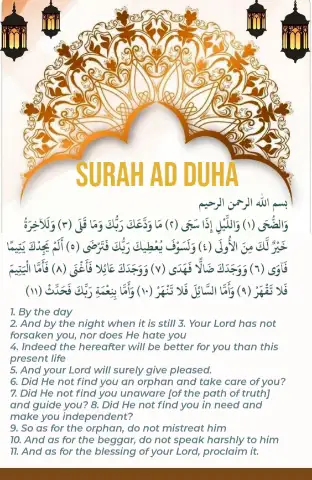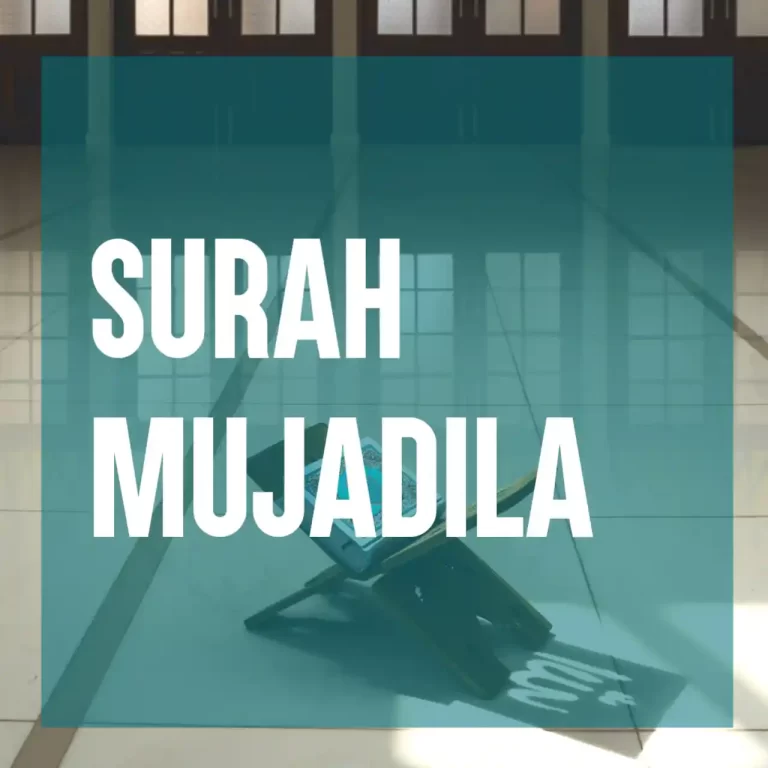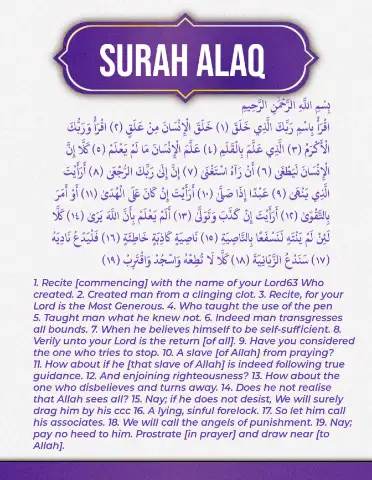Surah Ad Duha Translation, Arabic, And Transliteration In English
Advertisements
Surah Ad Duha is the 93rd Surah in the Qur’an. Here is surah ad duha translation in English and all you need to know about this beautiful surah.
Surah Ad Duha Translation In English
- By the day
- And by the night when it is still.
- Your Lord has not forsaken you, nor does He hate you.
- Indeed the hereafter will be better for you than this present life.
- And your Lord will surely give pleased.
- Did He not find you an orphan and take care of you?
- Did He not find you unaware [of the path of truth] and guide you?
- Did He not find you in need and make you independent?
- So as for the orphan, do not mistreat him.
- And as for the beggar, do not speak harshly to him.
- And as for the blessing of your Lord, proclaim it.
Surah Ad duha English Transliteration
- Waddduha
- Wallailii wama sajaa
- Ma wadda aka Rabbuka wama qalaa
- Walal akhirati khairan laka minal ula
- Wa la saufa yu’ud’iyka Rabbuka fatardaa
- Alam yajidka yatiyman fa’awaa
- Wawa jadaka daaalan fa hadaa
- Wawa jadaka aaa’ilan fa agnaa
- Fa ammal yatima fala taqhar
- Wa ammas sa’ila fala tan har
- Wa amma bini’imati Rabbika fahaddis
Ad Duha Surah In Arabic Text
بسم الله الرحمن الرحيم
وَالضُّحَى (١) وَاللَّيْلِ إِذَا سَجَى (٢) مَا وَدَّعَكَ رَبُّكَ وَمَا قَلَى (٣) وَلَلآخِرَةُ خَيْرٌ لَّكَ مِنَ الأُولَى (٤) وَلَسَوْفَ يُعْطِيكَ رَبُّكَ فَتَرْضَى (٥) أَلَمْ يَجِدْكَ يَتِيمًا فَآوَى (٦) وَوَجَدَكَ ضَالًّا فَهَدَى (٧) وَوَجَدَكَ عَائِلا فَأَغْنَى (٨) فَأَمَّا الْيَتِيمَ فَلا تَقْهَرْ (٩) وَأَمَّا السَّائِلَ فَلا تَنْهَرْ (١٠) وَأَمَّا بِنِعْمَةِ رَبِّكَ فَحَدِّثْ (١١)
Summary Of Surah Wad Duha
| Classification | Makki |
| Number of Verses | 11 |
| Order | 93 |
| Surah Before | Surah Lail |
| Position | juz 30 |
| Names | The Morning Brightness |
Why Was Surah Waduha Revealed?
Surah duha was revealed to Allah’s Messenger SAW at his first stage of prophethood in Makkah.
The polytheists tauted him about Allah temporarily suspending the revelation. He was saddenedd and distressed, thinking that his Lord was unhappy with him for some reason.
Advertisements
Then, with this surah, the revelation came back to him.
What Is The Meaning Of Suratul Duha?
In this surah, Allah swears by the day when its light spreads in the early morning, and by the night when it is still and darkness spreads and grows intense, that Allah cares for His Messenger.
Your Lord has not forsaken you that is, He has not abandoned you since He has always taken care of you, and He has not neglected you since He has always looked after you.
Indeed, He has continued to take the best care of you and to raise you in status, degree after degree.
Nor does He hate you that is He does not hate you for He has always loved you.
Advertisements
Denying something is indicative of its opposite, and negating something in absolute terms cannot be praise unless it implies perfection.
This is how the Messenger (SAW) was previously and at the moment of revelation, in the best and most perfect situation.
He was the recipient of ongoing divine love, which raised him in perfection for Allah always cared for him.
With regard to his future, Allah says: indeed the hereafter will be better for you than this present life.
The word akhirah (translated here as (hereafter) may refer to what comes after in general terms.
In other words, every future situation will be better than the previous one.
The Prophet (SAW) kept rising in status, and Allah supported the religion with which He sent him and helped him against his enemies.
Guiding him in all his affairs, until he died when he had attained a level of favours, bliss, delight and joy that could not be attained by anyone else, before or since.
Then after that, do not ask about his situation in the hereafter, and the details of its honour and all kinds of bliss.
Hence Allah says: and your Lord will surely give you so that you will be well pleased.
This is something that cannot be expressed except in this comprehensive phrase.
Then Allah reminds him of what He knows about his private affairs:
Did He not find you an orphan and take care of you.
That is, He found you without a mother or father; indeed his father and mother had died when he was not able to look after himself.
But Allah took care of him and caused his grandfather Abdul-Muttalib to take care of him.
Then when his grandfather died, He caused his paternal uncle Abu Talib to take care of him, until Allah supported him with His help and with the believers.
Did He not find you unaware of the path of truth and guide you?
That is, He found you not knowing anything about the scripture or faith, and He taught you that which you did not know and enabled you to attain the best of deeds and character.
Did He not find you in need that is, in poverty, and make you independent by means of what Allah enabled you to conquer of lands from which wealth and taxes were brought to you.
The One Who took away these problems from you will take away all other problems.
You should respond with gratitude to the blessings of the One Who caused you to attain this level of independence, granted you refuge, supported you and guided you.
Hence Allah says:
So as for the orphan, do not mistreat him that is, do not deal harshly with the orphan, and do not feel impatient with him or scorn him.
Rather you should honour him, give him what you can, and treat him as you would like your child to be treated after you die.
And as for the beggar, do not speak harshly to him.
That is, do not say anything to the beggar that may imply your rejection of his request in a cruel or vicious manner.
Rather give him what you can, or turn him away kindly.
The word translated here as beggar (sail, one who asks) includes those who ask for money and those who ask for knowledge.
Hence teachers are enjoined to treat learners kindly, gently and with compassion, for this will help the learner to achieve his goal, and it reflects kindness towards the one who is striving to benefit the people and the land.
And as for the blessing of your Lord this includes both spiritual and worldly blessings proclaim it.
That is, praise Allah for it, and mention it in specific terms if there is a purpose to be served thereby.
As for speaking of the blessings of Allah in general terms, speaking of the blessings of Allah prompts one to give thanks for them.
And leads to love of the One Who bestowed those blessings, for people are naturally inclined to love the one who does favours.
Tafseer Of Ad Duha Surah In English
The first verses react to assertions made by non-believers that Allah was displeased with him and had abandoned him.
Indeed, Allah had bestowed much on His Prophet SAW, including the Qur’an, which contains guidance for all humanity.
And, as Allah revealed in the Qur’an, he was blessed with a noble nature and temperament. Allah says,
And indeed you have an exalted standard of character.
The words of the surah reassure him that the pause in revelation was not owing to his own failing, and that the early difficulties he was facing will be surmounted.
Allah reminds him that He has been watching over him and preparing him for his task all along.
As a result, he is instructed to express his thanks by publicising his Lord’s gifts and bounties.
By the morning brilliance, Allah takes an oath, and then by the night when its darkness descends a time of activity and a time of rest.
A few commentators have drawn a comparison between these two seemingly disparate events and the disclosure followed by its interruption.
The oath highlights the importance of what comes next: support for the Prophet SAW and alleviation from his distress, as he couldn’t figure out why the revelations weren’t coming to him anymore.
Furthermore, the Makkan polytheists had begun to notice and humorously comment on this.
He The purpose of this promise is not only to reassure the Prophet (SAW), but also to refute the unbelievers’ accusation that Allah despised and abandoned him.
“O Muhammad, I think your devil has finally left you,” a woman exclaimed after he felt ill for a few days and did not stand for prayer.
The idolaters said in another story,
“Muhammad’s Lord has turned his back on him and despises him.”
As a result, Allah revealed these verses to us. While responding to his opponents’ taunts, Allah communicates straight to him.
He was concerned that he had made some mistake for which his Lord was angry, therefore he was assured that Allah had not abandoned him nor was He dissatisfied with him.
The revelation had not been postponed due to dissatisfaction; it was simply his Lord’s plan, which your Lord will fulfil, and you will be satisfied.
Allah gives the Prophet good tidings that the Hereafter (al-akhirah) would be better for him than this life, and that there He will provide him all he desires, making him please and content.
As evidenced by his seerah, the Messenger of Allah was the most apathetic of individuals when it came to worldly matters.
He said, “What do I have to do with this world? The example of me and this world is like a rider who rests in the shade of a tree and then moves on and leaves it.
Allah had already bestowed the most noble character upon His Prophet, and then bestowed the highest honour upon him by crowning him as humanity’s greatest and final prophet.
He bestowed upon him the Qur’an, which contains His teachings and direction for humanity.
He then provided him with steadfast and virtuous supporters, as well as a community of believers that would last generation after generation, pleading with Allah to pour blessings upon him till the end of time.
In the afterlife, he would be given the highest honour and be the first to enter Paradise.
Ibn Katheer added that in the Hereafter, Allah would provide him with intercession until He was satisfied and delighted with his ummah, in addition to the glory that He had provided for him.
The river al-Kawthar, whose banks are pearl domes and whose mud is the most fragrant musk, would be one of those blessings.
Some commentators added the interpretation that Allah was promising His Messenger that al-akhirah, or the later part of his life, would be greater than the first.
And that this promise was fulfilled with the expansion of Islam over the Arabian peninsula.
Then Allah reminds him of His never-ending protection and care.
Prophet Muammad SAW was an orphan when he was born. His father died before he was born, and his mother died while he was little.
Nonetheless, Allah made certain that he was always looked after, as he was placed under the supervision of his grandfather, Abdul-Muttalib, until he died when Prophet Muhammad was eight years old.
Abu Talib, his uncle, assumed responsibility for him after that and continued to love and protect him despite his refusal to join Islam.
So, despite his orphan status, Allah tells him that He had provided for his needs and prepared him for prophethood.
In addition, Allah provided Prophet Muhammad with guidance.
Despite the fact that his surroundings were rife with deception, ignorance, and heedlessness, Allah did not abandon him in his search.
He shielded him from the pre-Islamic Arabian society’s deviance, corruption, and immorality before revealing the truth.
Dhall can indicate clueless, unguided, or alone in Arabic.
Before the Qur’an was revealed to him, the Prophet had no knowledge of prior divine scriptures, but Allah guided and taught him, as well as his entire country.
In the Qur’an, He says:
And thus We have revealed to you an inspiration of Our command. You did not know what is the Book or [what is] faith, but We have made it a light by which We guide whom We will of Our servants. And indeed, [O Muhammad], you are guiding to a straight path.
Those who followed his instructions were to become the most honourable nation on earth, as well as leaders in human progress and civilisation, according to the Quran.
And after he had been poor, his Lord rewarded him.
First, He gave the Prophet with freedom and self-sufficiency through his marriage to Khadijah. As a result, he explained,
Wealth is not an abundance of possessions, but wealth is self-sufficiency of the soul.
Second, despite living a simple life with few possessions, he amassed enormous riches.
But whatever camels, animals, gold, or silver he acquired, he distributed to those in need among his people.
According to Uqbah bin al-arith,
“In Madinah, I prayed the asr prayer behind the Prophet. He stood up and immediately proceeded past the rows of people to one of his wives’ chambers after pronouncing the salm.
His hurry frightened the people.
He told them when he returned that he remembered a charity they had at home and detested that it remained in his custody, so he ordered its distribution.
In fact, enormous riches went through his hands, and he might have had access to all of the world’s joys and comforts.
He, on the other hand, never coveted or maintained stuff for himself.
The mention of Allah’s concern for the Prophet is a foreshadowing of what is to come.
In the last verses, Allah reminds His Messenger of the responsibilities that come with these benefits.
He instructs him, as well as the ummah as a whole, to follow a same code of conduct, emphasising charity to orphans and respect for their rights and persons.
In the same way as Allah protected and nurtured him as a child, he should protect and care for orphans.
He did so, and he inspired others by saying,
I and the sponsor of an orphan will be in Paradise like this,” and he held up his index and middle fingers.
Then Allah instructs him not to shun or reject anyone who comes to him with a need.
It is forbidden to ignore someone who seeks or requests something.
What Are The Lesson of Suratul Duha?
A believer must not be arrogant, oppressor, malicious, or cruel to Allah’s followers who seek assistance in any way.
According to Qatadah,
To respond to the destitute and needy with pity and tenderness” is what it means.
If you have something to contribute, do so graciously; if not, at the very least, show kindness and goodwill.
The prohibition from repelling a petitioner also applies to individuals seeking advice or information.
Never dismiss or dismiss such a person, especially when it comes to religious understanding.
It is obligatory to teach anybody who asks for clarification about Allah’s faith, just as Allah taught His Prophet.
Finally, Allah instructs his Messenger to express appreciation by making the blessings bestowed upon him known.
This is not a directive to brag, because the favour comes from Allah, not from him. It’s a statement of God’s goodness and grace.
Similarly, appreciation is shown when one receives help or kindness from another person.
According to Abu Hurayrah, the Prophet said,
Whoever does not thank people does not thank Allah.
Hadith
Speaking of Allah’s blessings, particularly those of guidance and faith, communicates thanks to the One who bestowed them.
It is the recipient’s tangible expression of gratitude.
Gratitude to Allah can also be expressed through sharing one’s blessings with others, including one’s wealth, education, talents, advice, or anything else that may be beneficial.
Allah Knows Best
Check out this page for more translation of various surahs.
Advertisements







